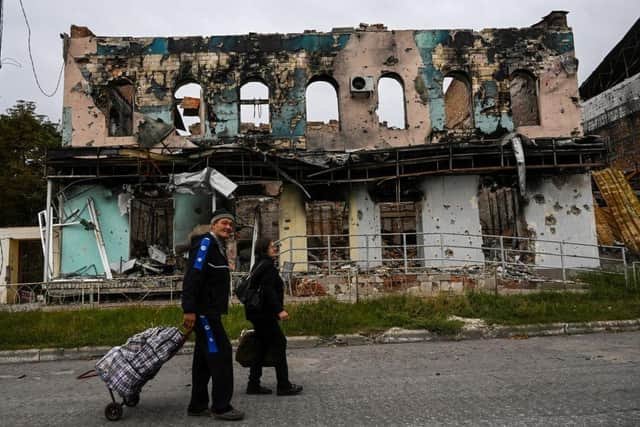War in Ukraine: Has Ukraine reached a turning point in the conflict with Russia?
The statement, one of the most frank accounts of Ukrainian success in recent days, came as Ukrainian president Volodymyr Zelensky said in his video address on Monday evening his troops have retaken more than 6,000sqkm (2,317 sq miles) from Russian control this month alone.
The MoD said the previously occupied areas, in the east and the south of Ukraine, had been held by Russian troops from the 1st Guards Tank Army (1 GTA), which it described as one of Russia’s “most prestigious armies”.
Advertisement
Hide AdAdvertisement
Hide AdThe scale of the gains by Ukraine has taken everyone by surprise.


Even Russia has admitted losing key cities in the north-eastern Kharkiv region, such as Balakliya, Izyum and Kupiansk. Reports claimed Russian troops had abandoned equipment, as Ukrainian soldiers utilised foreign weaponry, including long-range multiple rocket launch systems, and foreign intelligence to make gains at a speed that could not previously have been imagined.
The MoD said in a statement: “Elements of the Russian forces withdrawn from Kharkiv Oblast over the last week were from the 1st Guards Tank Army (1 GTA), which are subordinate to the Western Military District (WEMD). GTA suffered heavy casualties in the initial phase of the invasion and had not been fully reconstituted prior to the Ukrainian counter-offensive in Kharkiv.”
The organisation added: “GTA had been one of the most prestigious of Russia’s armies, allocated for the defence of Moscow, and intended to lead counter-attacks in the case of a war with Nato. With one GTA and other WEMD formations severely degraded, Russia’s conventional force designed to counter Nato is severely weakened. It will likely take years for Russia to rebuild this capability.”
Ukrainian intelligence units have described Russian troops as "literally running” away from the frontline amid claims of a collapse of their chain of command. However, Russian forces have continued to hammer Ukrainian targets, including the city of Lozova in the Kharkiv region, where three people were killed and nine and injured early on Tuesday.
In regained cities, Ukrainian troops are checking for Russian soldiers who may be hiding and cleaning up before residents who previously fled can return.
However, with Ukrainian gains, the war has also entered a new phase in terms of demands from the Ukrainian side.
Foreign minister Dmytro Kuleba said in a clear statement on Tuesday the country would not give in until borders were returned – not to the situation they were in in February, before the invasion began, but those established in 1991, when the Soviet Union was first dissolved.
Advertisement
Hide AdAdvertisement
Hide Ad"We learned to win, we know how to do it and we know how to make it,” he said. “And therefore, certainly, our ultimate goal is not February 23, but August 24, 1991 in the border plan.”
Mr Kuleba added: “Russia will show serious interest in real negotiations at the moment when it realises and accepts the fact that its positions have been maximally weakened. It cannot hold even what it has captured, it will need to sharply stabilise the situation."
He also indicated the global “security architecture” does not “perform its function” or “guarantee peace and security”, indicating he wants to see something new created in its place.
“It is obvious to everyone that the current mechanisms do not perform their function, do not guarantee peace and security,” he said.
Professor Luke March, personal chair of post-Soviet and comparative politics at the University of Edinburgh, said there was evidence that Ukraine had made progress. However, he warned while gains in the east were positive, few had been made in the region of Donetsk, where there has been discussions of a possibility of a referendum to take the self-declared state officially into Russia.
He said: “Obviously, they're trying to maximise the embarrassment. And they are trying to exaggerate anything they get, but they're also trying to trying to make the Russian troops fear them. They're hitting them where they're weak because they're not motivated and not fighting for their own territory and often don't know what they're there for.
"This actually can change the calculus because [the West] starts to think ‘well, maybe Ukraine can win’. Personally, I think, provided support for Ukraine survives the winter and all the high energy prices, then I think [Vladimir] Putin is in real trouble.”
Reports from Ukraine claim Russian teachers who were shipped into occupied regions by the Kremlin to teach the Russian curriculum to Ukrainian children have been arrested and could face up to 15 years in prison.
Advertisement
Hide AdAdvertisement
Hide AdProf March said he thinks Ukraine could be on shaky ground. Kyiv has said the teachers are not prisoners of war so will not be eligible for any kind of prisoner exchange.
He said: “I think there's a tendency in some Ukrainian politics that people need to keep attention on, in terms of the kind of slightly authoritarian, draconian side, the threat that they will deal with people as traitors and deal with them very punitively. I don't think Western support has made enough of that.
“We should not assume that the Ukrainian side are angels throughout this, despite the fact that they're fighting a fairly malevolent force. They need to be held to high standards throughout this as well. Particularly if their long-term aim is joining the EU and becoming a fully fledged democracy, then we can’t lose sight of how they treat combatants and those kind of issues as well."
Comments
Want to join the conversation? Please or to comment on this article.
